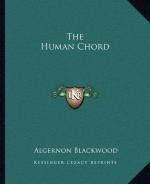“Splendid! Splendid!” exclaimed Spinrobin, utterly carried away by this spiritual enthusiasm. “I will follow you to the end—”
III
The words were scarcely out of his mouth when framed in the doorway, delicate and seductive as a witch, again stood Miriam, then moved softly forward into the room. Her face was pale as the grave. Her little, delicate mouth was set with resolution. Clearly she had overheard, but clearly also she had used the interval for serious reflection.
“We cannot possibly—fail, can we?” she asked, gliding up like a frightened fawn to the clergyman’s side.
He turned upon her, stern, even terrible. So relentless was his swift appearance, so implacable in purpose, that Spinrobin felt the sudden impulse to fly to her assistance. But instantly his great visage broke into a smile like the smile of thunderous clouds when unexpectedly the sun breaks through, then quickly hides itself again.
“Everywhere,” he roared, “true things are great and clean.... Have faith... have faith....” And he looked upon them both as though his eyes would sweep from their petty souls all vestige of what was afraid and immature. “We all are—pure ... we all are true ... each calls his note in singleness of heart ... we cannot fail!”
And just here Spinrobin, a little beyond himself with excitement probably, pattered across the room to his giant leader’s side and peered up into his visage. He stood on tiptoe, craning his neck forwards, then spoke very low:
“I have the right, we have the right—for I have earned it—to be taken now fully into confidence, and to know everything—everything,” came the words; and the reply, simple and immediate, that dropped back upon him through all that tangle of ragged beard was brief and to the point:
“You have. Listen, then—” And he led them both by the hand like two children towards the sofa, and then, standing over them, began to speak.
IV
“I seek,” he said slowly and gravely, “the correct utterance of a certain mighty and ineffable name, and in each of those four rooms lies a letter of its first syllable. For all these years of research”—his voice dropped suddenly—“have only brought me to that—the first syllable. And the name itself is composed of four, each more mighty than the last.”
A violent trembling ran over both listeners. Spinrobin, holding a cold little hand in his, dreaded unuttered sentences. For if mere letters could spell so vast a message, what must be the meaning of a whole syllable, and what the dire content of the completed name itself!
“Yes,” Skale went on with a reverence born of profoundest awe, “the captured sounds I hold are but the opening vibrations of this tremendous name, and the task is of such magnitude that absolute courage and absolute faith are essential. For the sounds are themselves creative sounds, and the consequences in case of faulty utterance might be too appalling to contemplate—”




